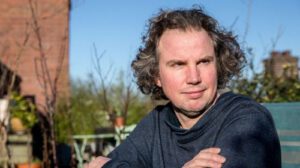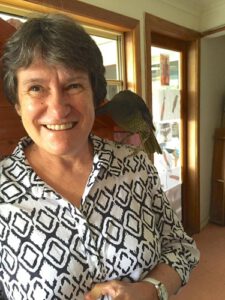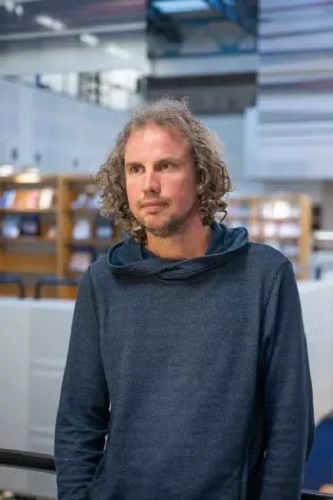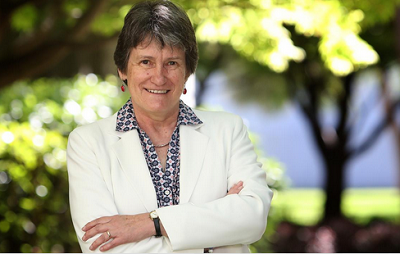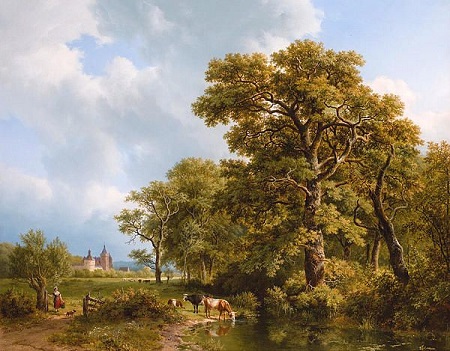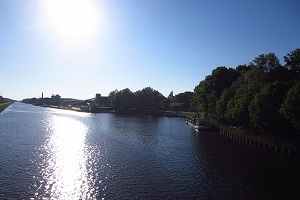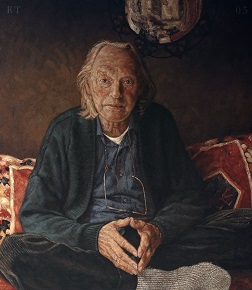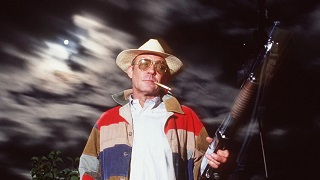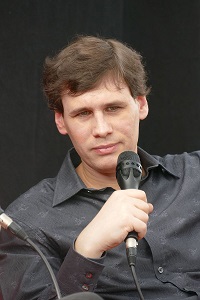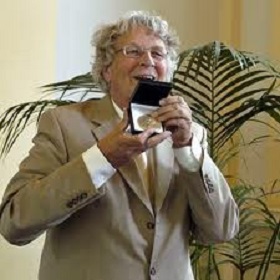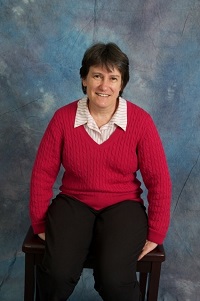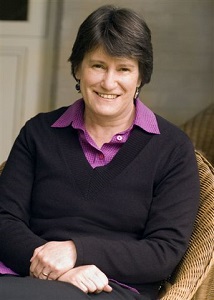Dolce far niente
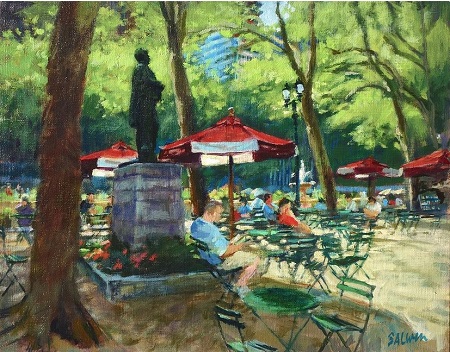
Bryant Park Reading Room door Peter Salwen, 2014
In The Park
Sitting on the grass
in the park—thinking about
what’s going by, about
the pinks and plenary reds
of today’s sunset.
Insects rampant as ions
off charged wires nipping,
tingling my legs.
Those buildings are like
bottles of scent fragile
in their lemon spray
mist and cologne light.
The harbour’s becoming
dark against the chromocosm
of the moon adrift
under the stars.
A gull squeaks—it’s
the sound of a pin
piercing polystyrene—it
carries out to the yachtmasts
moving mechanically
as wiper-bars, out to
the Opera House a duster
of starched serviettes.
Now, out to the suburbs,
those racks and racks
of tinted light
rising behind the trees.
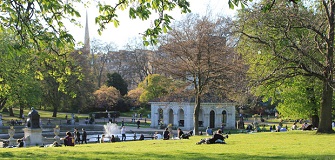
Judith Beveridge (Londen, 1956)
Hydepark in een zomers Londen
De Nederlandse dichter en schrijver Simon Vinkenoog werd op 18 juli 1928 in Amsterdam geboren. Zie ook alle tags voor Simon Vinkenoog op dit blog.
Robert
dit kan mijn geboorte nog niet zijn
dit is het leven van een ander –
het slaan van mijn hart is geen bewijs
en mijn mond is nog gesloten
dit is het bloeden van een rose keel
het woord dat de eerste daad verlamt
de hand die op mijn mond gelegd
aarzelend de gedichten zegt
waarin mijn vloeken
huizen naar beneden halen
dan sloop ik deze negenmaandse muur
waarop mijn vingers langzaam
het mene mene tekel schrijven
Groet
In de pijnkamer van onthechting
overgave deint en dreint
alles weten om niets te weten
lessen vergeten alles opnieuw
van te voren
kleine roofridder
hard als staal
adieu
Thelonious Monk
dit is een straat van parijs
met een arabier in de zon
die langzaam slenterend werkloos
loopt te zijn een 1951-noordafrikaan
ting ting ting in de bleke zon
zonder geluid
dit onder water uitgesproken
vonnis ting ting ting
ternauwernood de oppervlakte rakend
en met een strofe in de franse taal:
je donnerais ma vie
toute entière
pour un petit rire confus et obscène
herinnert aan de dierentuinapen
met mondbekken harige benen
en ronde gladde achterhanden
die gretig alle kleuren willen grijpen wit en zwart
ting ting ting
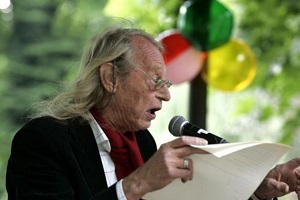
Simon Vinkenoog (18 juli 1928 – 12 juli 2009)
De Amerikaanse schrijver en journalist Hunter Stockton Thompson werd geboren in Louisville (Kentucky). op 18 juli 1937. Zie ook alle tags voor Hunter S. Thompson op dit blog.
Uit: Fear and Loathing in Las Vegas
“The only thing that really worried me was the ether. There is nothing in the world more helpless and irresponsible and depraved than a man in the depths of an ether binge. And I knew we’d get into that rotten stuff pretty soon. Probably at the next gas station. We had sampled almost everything else, and now – yes, it was time for a long snort of ether. And then do the next 100 miles in a horrible, slobbering sort of spastic stupor. The only way to keep alert on ether is to do up a lot of amyls – not all at once, but steadily, just enough to maintain the focus at 90 miles an hour through Barstow.
“Man, this is the way to travel,” said my attorney. He leaned over to turn the volume up on the radio, humming along with the rhythm section and kind of moaning the words: “One toke over the line … Sweet Jesus … One toke over the line …”
One toke? You poor fool! Wait till you see those goddamn bats. I could barely hear the radio … slumped over on the far side of the seat, grappling with a tape recorder turned all the way up on “Sympathy for the Devil.” That was the only tape we had, so we played it constantly, over and over, as a kind of demented counterpoint to the radio. And also to maintain our rhythm on the road. A constant speed is good for gas mileage – and for some reason that seemed important at the time. Indeed. On a trip like this one must be careful about gas consumption. Avoid those quick bursts of acceleration that drag blood to the back of the brain.
My attorney saw the hitchhiker long before I did. “Let’s give this boy a lift,” he said, and before I could mount any argument he was stopped and this poor Okie kid was running up to the car with a big grin on his face, saying, “Hot damn! I never rode in a convertible before!”
“Is that right?” I said. “Well, I guess you’re about ready, eh?”
The kid nodded eagerly as we roared off.
“We’re your friends,” said my attorney. “We’re not like the others.”
O Christ, I thought, he’s gone around the bend. “No more of that talk,” I said sharply. “Or I’ll put the leeches on you.” He grinned, seeming to understand. Luckily, the noise in the car was so awful – between the wind and the radio and the tape machine – that the kid in the back seat couldn’t hear a word we were saying. Or could he?”
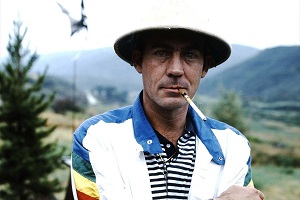
Hunter S. Thompson (18 juli 1937 – 20 februari 2005)
De Duitse dichter en schrijver Steffen Popp werd geboren op 18 juli 1978 in Greifswald. Zie ook alle tags voor Steffen Popp op dit blog.
Dickicht mit Reden und Augen
Möglichkeit und Methode überschneiden sich
ein kühner Satz bricht sich im Wald, fortan er hinkt
kein Sprung ins Dickicht dringt, kein Huf hinaus
kein ausrangiertes Fahrrad betet hier um Ruh
kein altes Lama spuckt, kein junges auch
sie hängen in den Tag, in Baumschaukeln
kein Baum, genau besehen, keine Schaukel, nicht mal
ein sie, nur hängen, Tag
Reden, durch nichts gedeckt, doch lebhaft
Lebewesen fast in einem Dickicht
hängend, hinkend eine, darum nicht weniger wahr
nicht wahr, nicht weniger, nicht – ungerührt
schaukeln oder grasen zur Pflege der Landschaft
oder stehen nur in ihr, schauen herüber mit Augen.
Betonstufen, die Meere
Bewegung (Luft), Meerfarbe (grün), ein Igel (die Technik eines Coyoten
ihn auf den Rücken zu drehen) – dein Herz, der nahe Hafen
dehnt sich an seinen Schlafkanten. Futter in Säcken, Munitionskisten
der gespaltene Huf eines Esels im Brackwasser –
das Meer zeigt dir Ufer (die Grenzen), du schläfst in deinen Staaten
es gibt Geheimzeichen, Türme (auf See blickend), Flugabwehr
Ingenieure mit Fliegerkappen – du zählst sie an Stränden, es sind Gelenke
und sie verbinden dich (wie eine Schrift) mit allen Dingen.
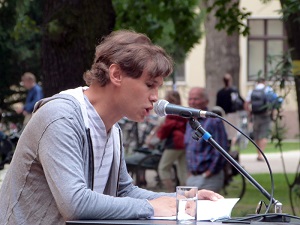
Steffen Popp (Greifswald, 18 juli 1978)
In 2013
De Noorse schrijver Per Petterson werd geboren in Oslo op 18 juli 1952. Zie ook alle tags voor Per Petterson op dit blog.
Uit: Out Stealing Horses (Vertaald door Anne Born Picador)
„Early November. It’s nine o’clock. The titmice are banging against the window. Sometimes they fly dizzily off after the impact, other times they fall and lie struggling in the new snow until they can take off again. I don’t know what they want that I have. I look out the window at the forest. There is a reddish light over the trees by the lake. It is starting to blow. I can see the shape of the wind on the water.
I live here now, in a small house in the far east of Norway. A river flows into the lake. It is not much of a river, and it gets shallow in the summer, but in the spring and autumn it runs briskly, and there are trout in it. I have caught some myself. The mouth of the river is only a hundred metres from here. I can just see it from my kitchen window once the birch leaves have fallen. As now in November. There is a cottage down by the river that I can see when its lights are on if I go out onto my doorstep. A man lives there. He is older than I am, I think. Or he seems to be. But perhaps that’s because I do not realise what I look like myself, or life has been tougher for him than it has been for me. I cannot rule that out. He has a dog, a border collie.
I have a bird table on a pole a little way out in my yard. When it is getting light in the morning I sit at the kitchen table with a cup of coffee and watch them come fluttering in. I have seen eight different species so far, which is more than anywhere else I have lived, but only the titmice fly into the window. I have lived in many places. Now I am here. When the light comes I have been awake for several hours. Stoked the fire. Walked around, read yesterday’s paper, washed yesterday’s dishes, there were not many. Listened to the B.B.C. I keep the radio on most of the day. I listen to the news, cannot break that habit, but I do not know what to make of it any more. They say sixty-seven is no age, not nowadays, and it does not feel it either, I feel pretty spry. But when I listen to the news it no longer has the same place in my life. It does not affect my view of the world as once it did. Maybe there is something wrong with the news, the way it is reported, maybe there’s too much of it. The good thing about the B.B.C.’s World Service, which is broadcast early in the morning, is that everything sounds foreign, that nothing is said about Norway, and that I can get updated on the position of countries like Jamaica, Pakistan, India and Sri Lanka in a sport such as cricket; a game I have never seen played and never will see, if I have a say in the matter. But what I have noticed is that ‘The Motherland’, England, is constantly being beaten. That’s always something.”

Per Petterson (Oslo, 18 juli 1952)
De Amerikaanse schrijfster en essayiste Elizabeth M. Gilbert werd geboren op 18 juli 1969 in Waterbury, Connecticut. Zie ook alle tags voor Elizabeth Gilbert op dit blog.
Uit: Big Magic
“When I talk about ‘creative living’ here, please understand that I am not necessarily talking about pursuing a life that is professionally or exclusively devoted to the arts. I’m not saying that you must become a poet who lives on a mountaintop in Greece, or that you must perform at Carnegie Hall, or that you must win the Palme d’Or at the Cannes Film Festival. (Though if you want to attempt any of these feats, by all means, have at it. I love watching people swing for the Bleachers.) No, when I refer to ‘creative living’ I am speaking more broadly. I’m talking about living a life that is driven more strongly by curiosity than by fear.
One of the coolest examples of creative living that I’ve seen in recent years, for instance, came from my friend Susan, who took up figure skating when she was forty years old. To be more precise, she actually already knew how to skate. She had competed in figure skating as a child and had always loved it, but she’d quit the sport during adolescence when it became clear she didn’t have quite enough talent to be a champion. (Ah, lovely adolescence when the ‘talented’ are officially shunted off from the herd, thus putting the total burden of society’s creative dreams on the thin shoulders of a few select souls, while condemning everyone else to live a more commonplace, inspiration-free existence! What a system…)
For the next quarter of a century, my friend Susan did not skate. Why bother, if you can’t be the best? Then she turned forty. She was listless. She was restless. She felt drab and heavy. She did a little soul-searching, the way one does on the big birthdays. She asked herself when was the last time she’d felt truly light, joyous, and – yes – creative in her own skin. To her shock, she realised that it had been decades since she’d felt that way. In fact, the last time she’d experienced such feelings had been as a teenager, back when she was still figure skating. She was appalled to discover that she had denied herself this life-affirming pursuit for so long, and she was curious to see if she still loved it.“

Elizabeth Gilbert (Waterbury, 18 juli 1969)
De Argentijnse schrijfster en vertaalster Alicia Steimberg werd geboren op 18 juli 1933 in Buenos Aires. Zie ook alle tags voor Alicia Steinberg op dit blog.
Uit: Call Me Magdalena
“They were helping themselves from all the dishes and trays, and they left everything a mess. They were playing with a little rubber ball, and suddenly one of them missed the mark and the ball fell into Enrique’s cup, and to top it all off he was dressed in a white shirt and blue tie at the time?’ “My God” “But nothing bothered us after the first bite of that crisp toast with butter and homemade duke de leche. And right after that a good cup of excellent coffee” “With milk?” “Yes, it was already mixed with the milk, in an enormous coffee pot?’ “Just like in those old-fashioned hotels” “Everything was old-fashioned in that house. Even the kitchen helper, who was white and chubby, with a blue dress and apron and white slippers, with freckles on her arms and chest. She was the one who knew how to make a cocktail with port and a beaten egg” “What’s it like?” “You have to go get the eggs from the henhouse and use them while they’re still warm. You separate the whites from the yolks. You can reserve the whites to make meringue. You beat the yolks with sugar until they take on a whitish color, and you add the port drop by drop, beating all the while. That woman beats egg yolks with sugar and port all day long?’
“Now let’s have breakfast in Mar del Plata, as you suggested?’ “This isn’t the same place where we always go?’ “But Hike it, dear. It’s sheltered from the wind and you can see the ocean. How many croissants do you want?” “How many do you think? Three, of course. Don’t they always bring three croissants with the café au lait?” “No, dear, that was before. Now you have to ask for the number of croissants you’re going to eat” “Why did they change it, dear?”
“Because diets have become so popular: croissants are very fattening. By the way, shouldn’t you be on a diet?” ‘
“Im not planning to diet in Mar del Plata, dear?’
“But you weigh 125.”
“And YOU weigh 150. Let’s go to the casino?”
“Later. I think I’m just going to order cafe au lait and nothing else. No croissants.”
“I’ll do the same, dear. Coffee with skim milk and artificial sweetener?’
“Now you’re talking?”
“May I ask your name? We’ve called each other ‘dear’ so much I’ve forgotten your name?’
“My name is Ignacio Ibargiiengoitia.”
“Basque?”‘
“Strange that you should ask after forty years of marriage. My grandparents were Basque, all four of them.”
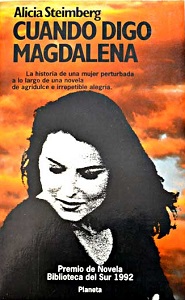
Alicia Steimberg (18 juli 1933 – 16 juni 2012)
Affiche
De Nederlandse schrijver, criticus en politicus Aad Nuis werd geboren op 18 juli 1933 in Sliedrecht. Zie ook alle tags voor Aad Nuis op dit blog.
Gezichten
Een gezicht nooit meer zien.
Een gezicht zien dat niet bestaat.
Langzaam duidelijker, totdat
ook de kleinste rimpels, putjes in de huid
een oogwenk helder zichtbaar zijn.
Maar het is geen gezicht.
Het was misschien een man die
honderd jaar dood is, en gestorven
zonder ooit te zijn afgebeeld.
Er zijn er zoveel.
Voor B.
Gedachteloze woorden raken dieper dan doordachte,
weloverwogene, ze snijden door het zachte
web dat onzichtbaar de vertrouwde dingen bindt.
Vastknopen kan dan niet. Geen goed woord dat ik vind.
Ik voel me dwaas – en even dwaas is alles weer terecht
als je gedachteloos ‘dag liefje’ zegt.
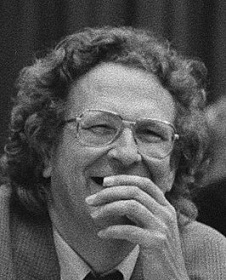
Aad Nuis (18 juli 1933 – 8 november 2007)
Zie voor nog meer schrijvers van de 18e juli ook mijn blog van 18 juli 2017 en ook mijn blog van 18 juli 2015 deel 2.
